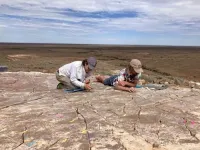(Press-News.org) In a new study,1 led by the University of Oxford’s Department of Physics and published today (18 November) in Nature, an international group of authors who developed the science behind net zero demonstrate that relying on ‘natural carbon sinks’ like forests and oceans to offset ongoing CO2 emissions from fossil fuel use will not actually stop global warming.
The science of net zero, developed over 15 years ago,2 does not include these natural carbon sinks in the definition of net human-induced CO2 emissions.
Natural sinks play a vital role to moderate the impact of current emissions and draw down atmospheric CO2 concentrations after the date of net zero, stabilizing global temperatures. Yet governments and corporations are increasingly turning to them to offset emissions, rather than reducing fossil fuel use or developing more permanent CO2 disposal options. Emissions accounting rules encourage this by creating an apparent equivalence between fossil fuel emissions and drawdown of CO2 by some natural carbon sinks, meaning a country could appear to have ‘achieved net zero’ whilst still contributing to ongoing warming.
The authors call on governments and corporations to clarify how much they are counting on natural carbon sinks to meet their climate goals, as well as recognising the need for Geological Net Zero.
Geological Net Zero means balancing flows of carbon into and out of the solid Earth, with one tonne of CO2 committed to geological storage for every tonne still generated by any continued fossil fuel use. Given the cost and challenges of permanent geological CO2 storage, achieving Geological Net Zero will require a substantial reduction in fossil fuel use.
The authors stress the importance of protecting and maintaining natural carbon sinks while accepting that doing so cannot compensate for ongoing fossil fuel use. Total historical CO2 emissions determine how much a country or company has contributed to the global need for ongoing natural carbon sinks. A country like the UK, with large historical emissions and limited natural sinks, has implicitly committed other countries to maintain natural sinks for decades after UK emissions reach net zero. This is not currently addressed in climate talks.
Professor Myles Allen, of the University of Oxford’s Department of Physics, who led the study, summarises: “We are already counting on forests and oceans to mop up our past emissions, most of which came from burning stuff we dug out of the ground. We can’t expect them to compensate for future emissions as well. By mid-century, any carbon that still comes out of the ground will have to go back down, to permanent storage. That’s Geological Net Zero.”
Dr Glen Peters, of the CICERO Center for International Climate Research in Oslo, Norway, a study co-author, says “Countries report both emissions and removals, but using all removals in climate targets is a recipe for continued warming. Natural carbon sinks currently clean up around half our annual emissions for free, but this ecosystem service must be kept separate from the fossil emissions driving climate change. Relabelling things will not stop global warming.”
Professor Kirsten Zickfeld of Simon Fraser University in British Columbia, Canada, co-author and leader of one of the other 2009 net zero papers, says “It is a common assumption that removing carbon from the atmosphere to offset burning of fossil fuels is as effective as not burning fossil fuels in the first place. It is not. Offsetting continued fossil fuel use with carbon removal will not be effective if the removal is already being counted on as part of the natural carbon cycle and if the carbon is not permanently stored. Unless we can increase transparency in national Greenhouse gas reporting and target setting, offsets will become part of the problem instead of part of the solution.”
Study co-author Professor Jo House of the University of Bristol UK says: “Land is limited, we rely on it for food, nature, biodiversity, leisure, water storage, and so on. It cannot offset more than a portion of fossil emissions even now, probably less in future with worsening pressures on the biosphere such as population increase, fires, and drought. Giving carbon credits for natural processes that are happening anyway undermines trust in the whole idea of offsetting. We have to urgently protect natural carbon sinks, but there are more scientifically credible and equitable ways of doing this than relying on carbon offset markets.”
Notes to editors:
For media requests and interviews, contact Dr Caroline Wood, University of Oxford: caroline.wood@admin.ox.ac.uk
An online briefing event with the lead authors will be held on Thursday 14 November at 14:00 GMT. If you would like to receive the joining link, contact Dr Caroline Wood: caroline.wood@admin.ox.ac.uk
1 The paper ‘Geological Net Zero and the need for disaggregated accounting for carbon sinks’ will be published in Nature at 16:00 GMT / 11:00 ET on Monday 18 November 2024 at https://www.nature.com/articles/s41586-024-08326-8 DOI: 10.1038/s41586-024-08326-8. To view a copy of the paper before this under embargo, contact Dr Caroline Wood, University of Oxford: caroline.wood@admin.ox.ac.uk
2 The 2009 ‘Net Zero Papers’ were Solomon et al, Meinshausen et al, Allen et al, Matthews et al, Zickfeld et al, and Gregory et al. All lead authors and most co-authors on those papers contributed to this study, together with other key scientists working on this issue.
If you would like to link to the news article about this work that will be published on the University of Oxford website, the link will be
https://www.ox.ac.uk/news/2024-11-18-redefining-net-zero-will-not-stop-global-warming-new-study-shows (page will go live at 16:00 GMT Monday 18 November)
About the University of Oxford:
Oxford University has been placed number 1 in the Times Higher Education World University Rankings for the ninth year running, and number 3 in the QS World Rankings 2024. At the heart of this success are the twin-pillars of our ground-breaking research and innovation and our distinctive educational offer. Oxford is world-famous for research and teaching excellence and home to some of the most talented people from across the globe. Our work helps the lives of millions, solving real-world problems through a huge network of partnerships and collaborations. The breadth and interdisciplinary nature of our research alongside our personalised approach to teaching sparks imaginative and inventive insights and solutions.
Through its research commercialisation arm, Oxford University Innovation, Oxford is the highest university patent filer in the UK and is ranked first in the UK for university spinouts, having created more than 300 new companies since 1988. Over a third of these companies have been created in the past five years. The university is a catalyst for prosperity in Oxfordshire and the United Kingdom, contributing £15.7 billion to the UK economy in 2018/19, and supports more than 28,000 full time jobs.
END
Redefining net zero will not stop global warming – scientists say
2024-11-18
ELSE PRESS RELEASES FROM THIS DATE:
Prevalence of cardiovascular-kidney-metabolic syndrome stages by social determinants of health
2024-11-18
About The Study: The results of this study suggest a disproportionate burden of cardiovascular-kidney-metabolic syndrome by social determinants of health and sex. These findings highlight the need to address inequities in cardiovascular-kidney-metabolic syndrome through targeted interventions.
Corresponding Author: To contact the corresponding author, Jie Guo, PhD, email jie.guo@ki.se.
To access the embargoed study: Visit our For The Media website at this link https://media.jamanetwork.com/
(doi:10.1001/jamanetworkopen.2024.45309)
Editor’s Note: Please see the article for ...
Tiny worm makes for big evolutionary discovery
2024-11-18
Everyone has a past. That includes the millions of species of insects, arachnids, and nematode worms that make up a major animal group called the Ecdysozoa.
Until recently, details about this group’s most distant past have been elusive. But a UC Riverside-led team has now identified the oldest known ecdysozoan in the fossil record and the only one from the Precambrian period. Their discovery of Uncus dzaugisi, a worm-like creature rarely over a few centimeters in length, is described in a paper published today in Current ...
Cause of the yo-yo effect deciphered
2024-11-18
Anyone who has ever tried to get rid of a few extra kilos knows the frustration: the weight drops initially, only to be back within a matter of weeks – the yo-yo effect has struck. Researchers at ETH Zurich have now been able to show that this is all down to epigenetics.
Epigenetics is the part of genetics that’s based not on the sequence of genetic building blocks but on small yet characteristic chemical markers on these building blocks. The sequence of building blocks has evolved over a long period of time; we all inherit them from our parents. Epigenetic markers, on the other hand, are more dynamic: environmental factors, our eating habits and the condition of our body ...
Suicide rates for young male cancer survivors triple in recent years
2024-11-18
LOS ANGELES — New research published in JAMA Network Open from USC Norris Comprehensive Cancer Center, part of Keck Medicine of USC, suggests that among all cancer survivors, male adolescents and young adults (AYA) have the highest rate of death by suicide.
The study also reports that the number of suicide deaths in the AYA male cancer survivor group (ages 15-39) increased three-fold during the 21-year-study period. In 2021, one in 65 deaths among the group was attributed to suicide. Suicide deaths have also increased for other cancer ...
Achalasia and esophageal cancer: A case report and literature review
2024-11-18
Achalasia is primarily caused by the degeneration of the myenteric plexus in the esophageal wall, leading to impaired relaxation of the lower esophageal sphincter (LES) and loss of esophageal peristalsis. Although the exact etiology is not fully understood, it is believed to involve autoimmune mechanisms and viral infections. Key pathological features include the absence of peristalsis, LES hypertonicity, and symptoms such as dysphagia and regurgitation. In this condition, the esophagus fails to contract and move food toward the stomach, while the LES ...
Authoritative review makes connections between electron density topology, future of materials modeling and how we understand mechanisms of phenomena in familiar devices at the atomistic level
2024-11-18
2024 marks an important milestone with the publication of a comprehensive review in Chemical Reviews on electron density-based methods. The review, authored by an international team, was spearheaded by leading researchers from Institute of Science Tokyo (Sergei Manzhos and Manabu Ihara of the Ihara-Manzhos lab) and included collaborators from Canada (Paul Ayers of McMaster University and Cherif Matta of Mount Saint Vincent University), China (Samantha Jenkins of Hunan Normal University), and the USA (Michele Pavanello from Rutgers University). The project also saw significant contributions from young researchers, Daniel Koch from ...
Understanding neonatal infectious diseases in low- and middle-income countries: New insights from a 30-year study
2024-11-18
Researchers from Peking University have conducted an in-depth study on the epidemic status, secular trends, and risk factors of 15 common neonatal infectious diseases across low- and middle-income countries (LMICs) from 1990 to 2019. The study, published in Health Data Science, provides a comprehensive overview of the changes in incidence and mortality rates, identifying key trends and potential areas for targeted public health interventions to improve neonatal health outcomes.
Neonatal infectious diseases remain a significant cause of morbidity and mortality in LMICs, where newborns are particularly vulnerable to infections due to underdeveloped immune systems ...
This year’s dazzling aurora produced a spectacular display… of citizen science
2024-11-18
Citizen scientists in Japan enabled researchers to learn why May 2024’s aurora appeared a magenta color over the country. This effort in extending research beyond academies and laboratories has greater consequence for humanity than explaining pretty lights
Around the world, the historic geomagnetic superstorm of late spring 2024 inspired millions of non-scientists around the world—many armed with highly sensitive smartphone cameras—to take a fantastic, unprecedented number of images of the aurora it produced.
In ...
New oral drug to calm abdominal pain
2024-11-18
University of Queensland researchers have developed a new class of oral painkillers to suppress chronic abdominal pain that is based on the peptide hormone oxytocin that drives childbirth contractions.
Associate Professor Markus Muttenthaler from UQ’s Institute for Molecular Bioscience led a team that has changed the chemical structure of oxytocin to make it gut-stable after earlier work revealed the hormone could treat abdominal pain.
Dr Muttenthaler said there was an urgent need for new ...
New framework champions equity in AI for health care
2024-11-18
(Toronto, November 18, 2024) A recent study published in the Journal of Medical Internet Research introduced the EDAI framework, a comprehensive guideline designed to embed equity, diversity, and inclusion (EDI) principles throughout the artificial intelligence (AI) lifecycle. Led by Dr Samira Abbasgholizadeh-Rahimi, PhD, the Canada Research Chair (Tier II) in AI and Advanced Digital Primary Health Care, the research addresses a significant gap in current AI development and implementation practices in health and oral health care, which often overlook critical EDI factors. With EDAI, AI ...




